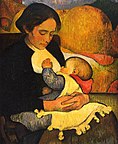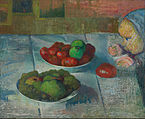Meijer de Haan
This article includes a list of references, related reading, or external links, but its sources remain unclear because it lacks inline citations. (May 2014) |

Meijer Isaac de Haan (April 14, 1852 – October 24, 1895) was a Dutch painter.
Biography
He was born into a successful Jewish family of biscuit manufacturers, close to the study of religion, music and art. He had already had some success in the Netherlands as a painter of Jewish genre works. In Amsterdam de Haan painted portraits and took on several pupils, including Joseph Jacob Isaacson, Louis Hartz and Baruch Lopes de Leao Laguna.
In the winter of 1888, accompanied by his pupil Joseph Jacob Isaacson, he went to Paris to continue his studies. There he met Pissarro, Theo van Gogh, and Paul Gauguin, back from Arles, whom De Haan accompanied to Brittany – first to Pont-Aven, and later to Le Pouldu, on the coast of Brittany.
Van Gogh introduced De Haan to his brother Vincent van Gogh, and Meijer de Haan exchanged several letters with Vincent. In Brittany, De Haan had a liaison with Marie Henry, the owner of the seaside hotel-café Buvette de la plage, where De Haan and Gauguin lodged in 1890-1891. They covered the walls of the dining area with impressionist murals, which were only papered over in the 1920s. Since their discovery, the murals have been restored and sold.
Marie Henry gave birth to a daughter who was called Ida, but De Haan left Le Pouldu and returned to Amsterdam. There are several stories why he left; though some say that Gauguin was jealous, it was probably simply due to his brother's cancelling his stipend, so he could no longer afford staying there. Though he never saw Marie Henry again, he later left all of his French paintings to her.
Today, the bar Buvette de la plage has been restored to its former appearance, with modern reproductions installed to replace the original wall paintings.
In 2010, the Musée d'Orsay staged an exhibition of De Haan's work, called A Master Revealed: Meijer de Haan.
Paintings
-
Maternity: Mary Henry Breastfeeding, in his post-impressionist style, 1890.
-
Before his trip south:The difficult question, 1880
-
Portrait of a young Jewish woman, 1886
-
Still-life with Profile
References
Sources
- Welsh-Ovcharov, Bogomila: Vincent van Gogh and the Birth of Cloisonism (!), Art Gallery of Ontario, Toronto, 24 January - 22 March 1981 and Rijksmuseum Vincent van Gogh, Amsterdam, 9 April - 14 June 1989 ISBN 0-919876-66-8
- VanGogh museum with one of the original wall paintings of a spinning Breton girl
- Article (Dutch) on Meijer de Haan in the Amsterdam Joodshistorischmuseum




